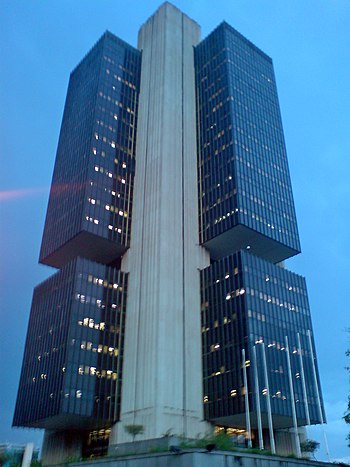Portal:Business
The Business and Economics Portal Business is the practice of making one's living or making money by producing or buying and selling products (such as goods and services). It is also "any activity or enterprise entered into for profit." A business entity is not necessarily separate from the owner and the creditors can hold the owner liable for debts the business has acquired. The taxation system for businesses is different from that of the corporates. A business structure does not allow for corporate tax rates. The proprietor is personally taxed on all income from the business. A distinction is made in law and public offices between the term business and a company such as a corporation or cooperative. Colloquially, the terms are used interchangeably. (Full article...) Economics (/ˌɛkəˈnɒmɪks, ˌiːkə-/) is a social science that studies the production, distribution, and consumption of goods and services. Economics focuses on the behaviour and interactions of economic agents and how economies work. Microeconomics analyses what's viewed as basic elements in the economy, including individual agents and markets, their interactions, and the outcomes of interactions. Individual agents may include, for example, households, firms, buyers, and sellers. Macroeconomics analyses the economy as a system where production, distribution, consumption, savings, and investment expenditure interact, and factors affecting it: factors of production, such as labour, capital, land, and enterprise, inflation, economic growth, and public policies that have impact on these elements. (Full article...) Selected articleThe London congestion charge is a fee charged on most motor vehicles operating within the Congestion Charge Zone (CCZ) in central London between 07:00 and 18:00 (Monday-Friday only). The charge, which was introduced on 17 February 2003, remains one of the largest congestion zones in the world despite the cancellation of the Western Extension which operated between February 2007 and January 2011. The charge aims to reduce congestion, and to raise investment funds for London's transport system. The standard charge is £10 for each day, for each non-exempt vehicle that travels within the zone with a penalty of between £60 and £187 levied for non-payment. Enforcement is primarily based on automatic number plate recognition (ANPR). Transport for London (TfL) is responsible for the charge which has been operated by IBM since 1 November 2009. Selected image
Selected economyThe economy of Canada is a highly developed mixed economy, with the world's tenth-largest economy , and a nominal GDP of approximately US$2.117 trillion. Canada is one of the world's largest trading nations, with a highly globalized economy. In 2021, Canadian trade in goods and services reached $2.016 trillion. Canada's exports totalled over $637 billion, while its imported goods were worth over $631 billion, of which approximately $391 billion originated from the United States. In 2018, Canada had a trade deficit in goods of $22 billion and a trade deficit in services of $25 billion. The Toronto Stock Exchange is the tenth-largest stock exchange in the world by market capitalization, listing over 1,500 companies with a combined market capitalization of over US$3 trillion. Canada has a strong cooperative banking sector, with the world's highest per-capita membership in credit unions. It ranks low in the Corruption Perceptions Index (14th in 2023) and "is widely regarded as among the least corrupt countries of the world". It ranks high in the Global Competitiveness Report (14th in 2019) and Global Innovation Indexes (15th in 2022). Canada's economy ranks above most Western nations on The Heritage Foundation's Index of Economic Freedom and experiences a relatively low level of income disparity. The country's average household disposable income per capita is "well above" the OECD average. Canada ranks among the lowest of the most developed countries for housing affordability and foreign direct investment. Among OECD members, Canada has a highly efficient and strong social security system; social expenditure stood at roughly 23.1% of GDP. (Full article...) Selected quote"In most job markets the employer is not sure of the productive capabilities of an individual at the time he hires him. Nor will this information necessarily become available to the employer immediately after hiring. The job may take time to learn. Often specific training is required. And there may be a contract period within which no recontracting is allowed. The fact that it takes time to learn an individual's productive capabilities means that hiring is an investment decision. The fact that these capabilities are not known beforehand makes the decision one under uncertainty. To hire someone, then, is frequently to purchase a lottery. In what follows, I shall assume the employer pays the certain monetary equivalent of the lottery to the individual as wage. If he is risk-neutral the wage is taken to be the individual's marginal contribution to the hiring organization."
TopicsRelated WikiProjectsDid you know (auto-generated) -
On this day in business history
General imagesThe following are images from various business-related articles on Wikipedia.
More did you know
Business news Wikinews Economy and business portal
|








































